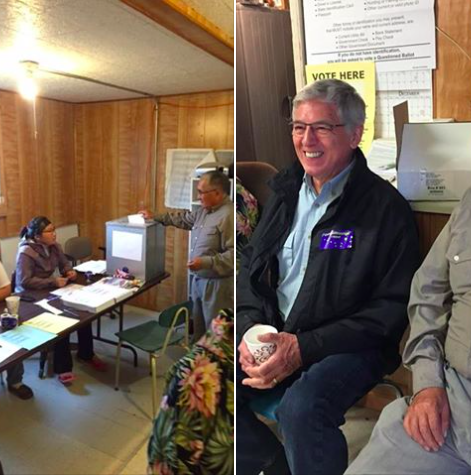It wasn’t until Anchorage Daily News reporter Nat Herz caught wind of irregularities in the 2016 General Election that the Division of Elections admitted its computers had been hacked not once, but twice.
The second attack was at 5:37 am on Election Day, 2016.
In what could be viewed as a cover-up by the Division of Elections, Election Division Director Josie Bahnke said she didn’t disclose it because the attack had no effect on the outcome of the elections.
Emails uncovered by Herz support that assertion but do not explain why no report was made to the public in the year and a half that followed, especially after the September, 2017 notification of Russian intrusion into Alaska’s Election Division data, which had also occurred in 2016.
REPUTATION MANAGEMENT FIRST
Yet there were other factors at play in 2016: The division, which operates under the supervision of Lt. Gov. Byron Mallott, had been under criticism after the primary because division staff had allowed some rural voters to vote two ballots — the Republican primary ballot and the “other” ballot. The double voting in Shungnak was first identified by Must Read Alaska.
The rural voting irregularities likely led to the narrow defeat of Rep. Ben Nageak of Barrow, replaced by Rep. Dean Westlake, the Democrats’ favored candidate. (Westlake was forced to resign in January of 2018, after allegations of harassment were made against him.)
[Read: Byron Mallott’s terrible, horrible, very bad, no good election]
The extent of failings in the 2016 Primary process were significant. Westlake won by just 8 votes, and at least 50 people in Shungnak were given both Republican and “other” ballots. Through a challenge by the Alaska Republican Party, a Superior Court judge reversed the election and gave Nageak the win, but the Supreme Court upheld the election of Westlake.

After the stain of election irregularities and having to have the election decided by the Supreme Court, Bahnke was under pressure to have a clean General Election.
Bahnke is sticking to prepared statements now, most likely heavily vetted by the Department of Law.
A MISSED OPPORTUNITY TO BE TRANSPARENT
On Feb. 27, 2018, Bahnke responded to media reports of the 2016 Russian cyber scan of the Election Division, saying, “Many businesses and governments have had threat actors scan systems, which is like a robber rattling the door knob or trying to peek in the windows. But scanning a system, versus breaking and entering, are two very different scenarios. We have extensive procedures to secure our information, with multiple layers of security which include a combination of people, processes and technologies to help us conduct secure, trustworthy and accurate elections.”
By the time she made that statement, she had known for more than a year that there had been a second attack, but did not reveal it, instead reassuring the public of the “secure, trustworthy and accurate elections.”
Former Lt. Gov. Loren Leman read the story and said, “My reaction was one of surprise when I read that story. Of course, when things like that happen, we have to decide if releasing the information helps the bad guys. In this case, I would have asked Laura Glaiser and Whitney Brewster at the Division of Elections to discuss this with IT and Risk Management staff and then direct them to be as candid as they could that a system attack occurred, but we were able to defend against it. We wouldn’t have revealed details about the protections we use, but would want to give the public confidence that we are on top of our game in protecting the integrity of elections.”
The Elections Division website has a devoted a section on its front page relating to the Russian attack, which was revealed by the Department of Homeland Security, but makes no mention of the second attack.

Bahnke is sticking with her account of the 2016 election and saying there was no need to inform the public because the election was not “impeded” by the attack. Still not known is what Lt. Gov. Byron Mallott knew and when he knew it, or whether the governor himself was informed.
WAS THE ELECTION WORK GROUP INFORMED?
Mallott convened an election work group last year to advise him and the Elections Division on changes to the way Alaskans vote, including the possible move to a mail-in ballot.
The issue of hacking has not been on the group’s agenda, and has not been discussed at any of its meetings. It appears this high-level working group, which includes a representative from the Department of Law, has not been made aware of the Election Day hack of state computers, or the subject has been kept off of official minutes by Mallott and Bahnke.
[View Election Working Group meeting packet of Jan. 30, 2018]
The group is meeting today and tomorrow in Anchorage to review vendors for a new ballot system.
Tuckerman Babcock, chair of the Alaska Republican Party, said that members of the working group are reviewing vendors without knowing what they need to protect against.
“Here she and Byron Mallott have had ongoing meetings about changing the election system. You can’t have an ongoing discussion about changing the election system, while you are not telling people what the problems are. You have to go overboard with transparency and honesty when you run elections,” said Babcock, who started his career working at the Division of Elections in high school.
When Sean Parnell was lieutenant governor, he convened an election security project, which was an ongoing study of Alaska elections, done in cooperation with former Lt. Gov. Fran Ulmer, who was the chancellor of the University of Alaska Anchorage. Later, Lt. Gov. Mead Treadwell kept the project going.
The focus during those administrations was on security of the elections, a focus that has shifted under the Walker-Mallott regime to expanding voter turnout in rural Alaska.
